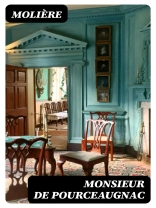In ‘Monsieur De Pourceaugnac, ‘ Molière masterfully weaves a comedic tapestry that satirizes the follies of social pretension and the absurdities of love. This three-act farce, set in 17th-century France, employs rapid dialogue, mistaken identities, and clever wordplay to illustrate the tensions between the bourgeoisie and the nobility. The play encapsulates the essence of Molière’s theatrical style, marked by its sharp wit and keen observations of human behavior, reflecting the societal dynamics of his time and the burgeoning middle class’s ascent in the wake of the French Renaissance. Molière, born Jean-Baptiste Poquelin, was a playwright and actor whose own experiences in the theater and society profoundly shaped his works. His works often draw from his personal encounters with the upper classes and his disdain for their pretentiousness. ‘Monsieur De Pourceaugnac’ showcases his exceptional ability to critique societal norms while entertaining audiences, a reflection of his lifelong quest to portray the absurdities of human vice. This delightful play is highly recommended for readers who appreciate sharp social commentary wrapped in humor. Molière’s enduring wit and keen insights make ‘Monsieur De Pourceaugnac’ not only a testament to the playful spirit of the age but also a timeless exploration of human folly, inviting readers to reflect on their own societal engagements.
关于作者
Molière, born Jean-Baptiste Poquelin on January 15, 1622, in Paris, France, is widely regarded as one of the greatest writers in the French language and universal literature. Renowned for his brilliant comedies, Molière’s work deftly combines profound wit with a keen observation of social mores and human character. Before committing himself entirely to the stage, Molière attended the prestigious Collège de Clermont, now known as Lycée Louis-le-Grand, where he received a thorough classical education. His father held the royal appointment of upholsterer, which might have become Molière’s profession had the lure of the theatre not proven stronger. In 1643, Molière founded the Illustre Théâtre, but this early venture into theater management met with financial difficulties and ultimately bankruptcy. It was after this setback that he assumed the stage name ‘Molière.’ Despite this early challenge, Molière’s career flourished following his return to Paris in 1658, when his troupe gained the patronage of Louis XIV. Molière’s plays are often seen as precursors to the satirical works of later centuries. ‘Monsieur de Pourceaugnac, ‘ one of his lesser-known pieces, reflects his innovative use of comedy ballets, incorporating musical interludes that enhanced the satirical impact of his societal critiques. Molière’s oeuvre includes such classics as ‘Tartuffe, ‘ ‘The Misanthrope, ‘ and ‘The Imaginary Invalid, ‘ with his unique blend of farce, satire, and character study. His literary style, which combines the traditions of the commedia dell’arte with the more refined French farce, showcases his exceptional skill as a playwright and actor. Molière died on February 17, 1673, shortly after collapsing on stage in a performance of his final play, ‘The Imaginary Invalid.’ Nonetheless, his works continue to be pivotal in theatrical repertoires and studies of literature, captivating audiences and readers for centuries.












